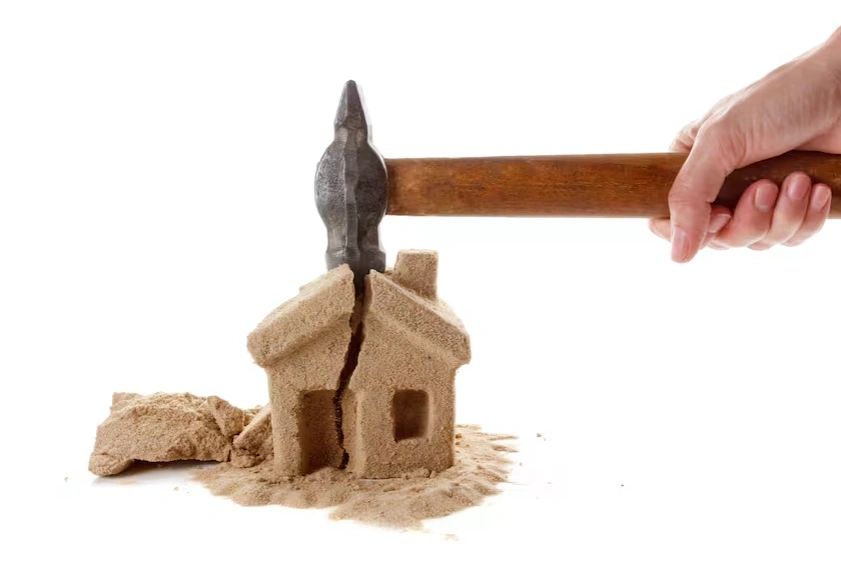BuySellBA
Administrator
Real estate: Banks are lending less and the sector is recalculating. What will happen to prices? - La Nacion Propiedades

Source:

 www.lanacion.com.ar
www.lanacion.com.ar
September 04, 2025
Higher financing rates, a rising dollar, and increasingly restrictive conditions are driving away the dream of owning a home.
By Candela Contreras

The credit crunch could affect property prices. Shutterstock
The global housing crisis is becoming increasingly critical . In the United States, access to homeownership is at its most critical level in nearly four decades, with mortgage rates approaching 7.5%, forcing thousands of families to flee the American dream, and with Donald Trump considering declaring a national housing emergency.
In Europe, rising prices in cities like Paris, Madrid, and Berlin have turned property into a luxury reserved for the few.
Argentina is not far behind: the dream of owning a home is slowly crumbling .
As the dollar threatens to hit the ceiling of a government-established exchange rate band, and banks seek ways to "manage" demand for mortgage loans with ever-rising interest rates that are forcing more and more people to fall through the cracks, new restrictions are being imposed on those hoping to get a mortgage .
"Today is not the time to take out a mortgage," summarized a source working in the credit department of one of the first banks to announce its housing lines . "Rates are not attractive to borrowers because the current situation is working against the good period loans were experiencing. For credit to become more available, we need to develop the secondary market, which seemed to be on the way, but now the electoral turmoil calls it into question," the same source stated.
The clearest example was Banco Macro , which raised its annual nominal interest rate (APR) to 15% , its highest rate to date. Meanwhile, Banco Nación did not raise its rate, but it did raise its credit scoring requirements . This means that a near-perfect credit profile is now required to qualify for a loan.
The reasons behind this tightening are multiple: a lack of funding for banks to lend significant amounts of money over 20 or 30 years, pre-election uncertainty , rates that are making installments more expensive , and a country risk that keeps the financial system on alert. "Raising the scoring rate to such a high level is a way to stop lending without changing the rate," acknowledged a real estate broker .
In the real estate sector, they say that many ongoing transactions were interrupted because banks changed the rules mid-game : "Suddenly, they tell you they've raised the scoring or some other requirement, and you're out," said one broker .

A bank assured that it is no longer the time to take out a mortgage loan. Shutterstock
Why do credit scores rise ? Banks increase the credit score required for mortgage loans when they perceive an increase in overall economic risk. By doing so, they ensure that only the most creditworthy customers with the greatest repayment capacity can access a loan.
In this context, Banco Nación clarified that "risk policies are dynamic and evolve like the market, but we continue to provide mortgage loans."
Regarding the explanation for why more and more banks are joining the rate hikes and tightening their conditions, Fabián Achával, economist and owner of the real estate company of the same name, said it's a macro issue: "They are different aspects of everything that's happening. During a pre-election period, there's always exchange rate volatility because people dollarize their portfolios."
He explained that " the government wanted to minimize exchange rate volatility and ended up raising interest rates . This caused banks to lose their balance and lost their lending capacity, so some raised interest rates to prohibitively high levels, while others changed other requirements such as scoring ."
“ I'm worried about a serious slowdown ; the sector was bloated with all the demand there was,” says one market player. Mortgage financing accounts for nearly 20% of transactions in the capital, and without that leg, demand shrinks. “If credit dries up, 20% of demand dries up. So, how do you explain the rise in used prices? ” asks Federico González Rouco, an economist specializing in housing.
At the same time, the rise in the dollar left many people unable to access housing. "These are people who were eligible months ago and now they aren't," said Alejandro Moretti of Nuevo Siglo Propiedades.
In other cases, he acknowledged that "credit became unviable because the down payment rose too much after the rate adjustment. This increase is not minor: today, rates are at high levels and are determining whether a transaction moves forward or not."
Bryn emphasizes increasingly stringent mechanisms : banks are now requiring more years of seniority in a job or as a client. "It's not that banks formally reject all loans, but they're making them more restrictive and difficult to sustain," he explains. The result: real estate agencies with failed deals, wasted time, and negotiations that become more difficult.
Moretti added that credit transactions will decline; there's less demand in practice. Therefore, cash purchases, which were linked to credit purchases, will also decrease.

The dream of owning a home falls apart. Daniel Basualdo
Along the same lines, González Rouco acknowledged that "the outlook for the coming scenario is different with or without credit. The market was structured to have financing, so if there's no credit, it will have to restructure itself again or wait for everything to rearrange itself next year and mortgage financing to return."
Added to this is the lack of liquidity in banks . "If there isn't a government that ensures banks have liquidity, it's practically impossible. I think this is the ceiling; operations are already declining ," the economist said.
“We don't expect a drop in value, because without credit, a lot of sales still happen. But there may be more room for counteroffers and negotiation, especially in transactions that depended on credit,” Bryn responded.
Credit currently represents nearly 20% of total transactions in Buenos Aires. Many buyers who can still access cash or alternatives find that used square meters are relatively cheap compared to other options.
In short, the first half of 2025 raised expectations with a rebound in mortgage lending ; but the second half brought a readjustment.
The combination: loans with prohibitive rates for many , requirements that act as additional filters , and a rising dollar jeopardize access to homeownership.
Operations are plateauing while others are falling apart . For specialists, many of the answers to what's next will be answered after the election results.
Meanwhile, the mortgage loans that made 2024 a year in which the dream of owning a home was once again on the minds of many Argentinians may now remain only for a select few.
www.buysellba.com
Source:
Propiedades: los bancos dan menos crédito y el sector recalcula, ¿qué pasará con los precios?
Financiamiento a tasas más altas, un dólar en alza y condiciones cada vez más restrictivas, alejan el sueño de la casa propia
September 04, 2025
Higher financing rates, a rising dollar, and increasingly restrictive conditions are driving away the dream of owning a home.
By Candela Contreras

The credit crunch could affect property prices. Shutterstock
The global housing crisis is becoming increasingly critical . In the United States, access to homeownership is at its most critical level in nearly four decades, with mortgage rates approaching 7.5%, forcing thousands of families to flee the American dream, and with Donald Trump considering declaring a national housing emergency.
In Europe, rising prices in cities like Paris, Madrid, and Berlin have turned property into a luxury reserved for the few.
Argentina is not far behind: the dream of owning a home is slowly crumbling .
As the dollar threatens to hit the ceiling of a government-established exchange rate band, and banks seek ways to "manage" demand for mortgage loans with ever-rising interest rates that are forcing more and more people to fall through the cracks, new restrictions are being imposed on those hoping to get a mortgage .
"Today is not the time to take out a mortgage," summarized a source working in the credit department of one of the first banks to announce its housing lines . "Rates are not attractive to borrowers because the current situation is working against the good period loans were experiencing. For credit to become more available, we need to develop the secondary market, which seemed to be on the way, but now the electoral turmoil calls it into question," the same source stated.
The clearest example was Banco Macro , which raised its annual nominal interest rate (APR) to 15% , its highest rate to date. Meanwhile, Banco Nación did not raise its rate, but it did raise its credit scoring requirements . This means that a near-perfect credit profile is now required to qualify for a loan.
The reasons behind this tightening are multiple: a lack of funding for banks to lend significant amounts of money over 20 or 30 years, pre-election uncertainty , rates that are making installments more expensive , and a country risk that keeps the financial system on alert. "Raising the scoring rate to such a high level is a way to stop lending without changing the rate," acknowledged a real estate broker .
In the real estate sector, they say that many ongoing transactions were interrupted because banks changed the rules mid-game : "Suddenly, they tell you they've raised the scoring or some other requirement, and you're out," said one broker .

A bank assured that it is no longer the time to take out a mortgage loan. Shutterstock
Why do credit scores rise ? Banks increase the credit score required for mortgage loans when they perceive an increase in overall economic risk. By doing so, they ensure that only the most creditworthy customers with the greatest repayment capacity can access a loan.
In this context, Banco Nación clarified that "risk policies are dynamic and evolve like the market, but we continue to provide mortgage loans."
Regarding the explanation for why more and more banks are joining the rate hikes and tightening their conditions, Fabián Achával, economist and owner of the real estate company of the same name, said it's a macro issue: "They are different aspects of everything that's happening. During a pre-election period, there's always exchange rate volatility because people dollarize their portfolios."
He explained that " the government wanted to minimize exchange rate volatility and ended up raising interest rates . This caused banks to lose their balance and lost their lending capacity, so some raised interest rates to prohibitively high levels, while others changed other requirements such as scoring ."
Rates, dollar and requirements: a three-way tie
The outlook is further complicated by the rise of the dollar : just two months ago, it was almost $200 less than it is now. Loans granted before July were issued in a parallel currency at around $1,200, while in August, the situation was completely different.“ I'm worried about a serious slowdown ; the sector was bloated with all the demand there was,” says one market player. Mortgage financing accounts for nearly 20% of transactions in the capital, and without that leg, demand shrinks. “If credit dries up, 20% of demand dries up. So, how do you explain the rise in used prices? ” asks Federico González Rouco, an economist specializing in housing.
At the same time, the rise in the dollar left many people unable to access housing. "These are people who were eligible months ago and now they aren't," said Alejandro Moretti of Nuevo Siglo Propiedades.
There are already operations stopped
In practice, the changes are being seen in real estate agencies. "There were practically closed transactions that were halted at the last minute: buyers with initial approval who, when the bank recalculated, found themselves with new requirements or lower loan amounts than expected," said Daniel Bryn, head of Invertire Real Estate .In other cases, he acknowledged that "credit became unviable because the down payment rose too much after the rate adjustment. This increase is not minor: today, rates are at high levels and are determining whether a transaction moves forward or not."
Bryn emphasizes increasingly stringent mechanisms : banks are now requiring more years of seniority in a job or as a client. "It's not that banks formally reject all loans, but they're making them more restrictive and difficult to sustain," he explains. The result: real estate agencies with failed deals, wasted time, and negotiations that become more difficult.
Moretti added that credit transactions will decline; there's less demand in practice. Therefore, cash purchases, which were linked to credit purchases, will also decrease.

The dream of owning a home falls apart. Daniel Basualdo
What will happen to the credits?
Achával offered a forecast to the market: "Mortgage lending is going to slow down significantly, and that will have a multiplier effect on other transactions due to the same market chain effect ," adding that they must wait for this turbulence to calm down, "even though everything will depend on what happens with the elections."Along the same lines, González Rouco acknowledged that "the outlook for the coming scenario is different with or without credit. The market was structured to have financing, so if there's no credit, it will have to restructure itself again or wait for everything to rearrange itself next year and mortgage financing to return."
Added to this is the lack of liquidity in banks . "If there isn't a government that ensures banks have liquidity, it's practically impossible. I think this is the ceiling; operations are already declining ," the economist said.
What will happen to property prices?
For now, there's no consensus on a widespread price drop . The market shows room for negotiation and downward pressure in specific segments, especially in properties that relied on credit.“We don't expect a drop in value, because without credit, a lot of sales still happen. But there may be more room for counteroffers and negotiation, especially in transactions that depended on credit,” Bryn responded.
Credit currently represents nearly 20% of total transactions in Buenos Aires. Many buyers who can still access cash or alternatives find that used square meters are relatively cheap compared to other options.
In short, the first half of 2025 raised expectations with a rebound in mortgage lending ; but the second half brought a readjustment.
The combination: loans with prohibitive rates for many , requirements that act as additional filters , and a rising dollar jeopardize access to homeownership.
Operations are plateauing while others are falling apart . For specialists, many of the answers to what's next will be answered after the election results.
Meanwhile, the mortgage loans that made 2024 a year in which the dream of owning a home was once again on the minds of many Argentinians may now remain only for a select few.
www.buysellba.com

